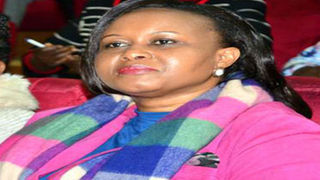
Gatundu North MP Wanjiku Kibe lost her seat recently .
| File | Nation Media GroupPolitics
Premium
Big win for MCAs eyeing MP post
What you need to know:
- The Building Bridges Initiative’s Constitutional (Amendment) Bill, 2020, proposes the removal of the provision that disqualifies MCAs from election as MPs.
- It would be a relief for MCAs seeking to vie for parliamentary seats in the 2022 General Election.
The law that cost Gatundu North MP Wanjiku Kibe her seat is targeted for removal under proposed amendments to the Constitution.
The Building Bridges Initiative’s Constitutional (Amendment) Bill, 2020, proposes the removal of the provision that disqualifies Members of County Assemblies from election as Members of Parliament.
It will be a relief for MCAs seeking to vie for parliamentary seats in the 2022 General Election and, alongside a Ward Development Fund, it’s another sweetener to win the draft constitutional Bill support in the county assemblies.
The Bill must be passed by at least 24 county assemblies to be propelled to Parliament on the path to a referendum.
“A person is disqualified from being elected a Member of Parliament if the person is a Member of a County Assembly,” stipulates Article 99 (2) of the constitution that is earmarked for amendment.
Clause 13 of the Bill proposes to amend Article 99 on qualification and disqualifications for election as Member of Parliament to remove the provision barring MCAs from nomination to vie for constituency seats.
Not eligible
Ms Kibe’s election was nullified by the High Court, which agreed with the petitioner, former MP Kung’u Waibara that she was ineligible to contest the parliamentary seat as she had not resigned her post as nominated MCA in Kiambu County Assembly.

Former Gatundu North MP Clement Kung’u Waibara.
Mr Waibara successfully petitioned the court to find that Mr Kibe held office as an MP for Gatundu North constituency in violation of the Constitution because she was not qualified to contest parliamentary elections on August 8, 2017.
Prior to her election as MP, she had served as a nominated MCA for five years from July 17, 2013.
Mr Waibara argued the electoral commission ought not to have cleared the Jubilee Party candidate to contest the constituency seat since her term as an MCA was yet to expire.
“That at all the material times up to the date of the General Election, the 1st respondent was enjoying all the benefits and responsibilities attendant to the office of MCA – Kiambu County,” the court observed.
Mr Waibara argued a person stands disqualified if at the date of the election he/she was an MCA.
Many MPs
It’s a judgment that exposed scores of other MPs who were serving as MCAs prior to the 2017 elections.
They include Maragua MP Mary Wamaua, Catherine Waruguru (Laikipia Woman Rep), Joyce Korir (Bomet Woman Rep), Gladys Mbeyu (Kilifi Woman Rep), Asha Mohammed (Mombasa Woman Rep) and Kakamega Senator Cleophas Malala.

Laikipia Women Rep Ms Catherine Waruguru.
Others are Laikipia West MP Patrick Mariru and Nakuru Senator Susan Kihika. Ahead of the 2017 General Election, the two were speakers of Laikipia and Nakuru county assemblies, respectively.

Laikipia West MP Patrick Mariru.

Nakuru Senator Susan Kihika.
The BBI Bill also proposes to amend Article 177 on membership of county assembly to introduce the nomination of candidates through a party list.
A political party will be entitled to nominate the candidates based on the votes it receives in an election, instead of the current status where it is based on the seats won.
Further, it seeks to align the term of county assemblies to the election cycle.
The Bill also establishes a Ward Development Fund for MCAs. The Fund shall comprise of at least five per cent of all the county government's revenue in each financial year.
Equitable distribution
The BBI report explains the allocation is to ensure equitable distribution among Wards of money allocated or collected by the county government.
Another amendment proposes to eliminate the uncertainty that rocks a county cabinet whenever a governor is impeached or dies.
The amendment is to ensure that a member of the county executive committee does not automatically vacate office when the office of the county governor becomes vacant.
The proposed amendment targets Article 179 to provide clarity that a county governor has powers to dismiss or reassign their county executive committee members.
Another proposal seeks to amend provisions on County Appropriation Bills to free the preparation of county annual budgets from being based on the Division of Revenue Bill.
This is in light of the fact that a county government can prepare its budget based on its own sources of revenue.
This would spare counties, which can survive on their own revenue, a cash crisis, such as that witnessed recently when a standoff in Parliament over the revenue formula shutdown the devolved units.
(Download a copy of the BBI Report: BBI REPORT)





